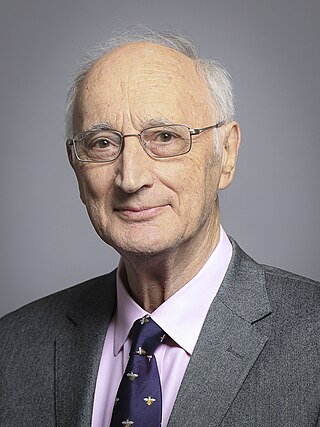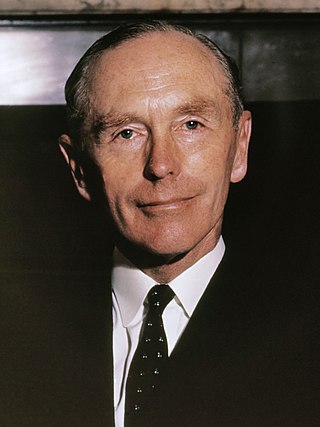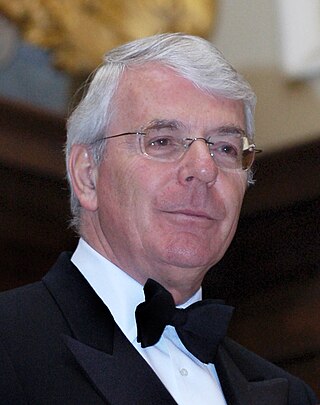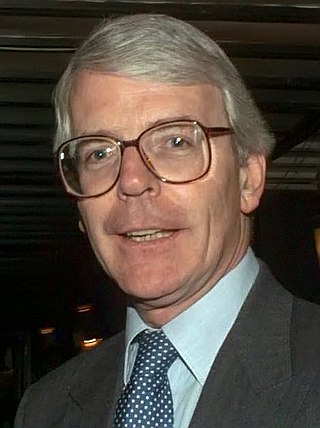
George Samuel Knatchbull Young, Baron Young of Cookham,, known as Sir George Young, 6th Baronet from 1960 to 2015, is a British Conservative Party politician who served as a Member of Parliament (MP) from 1974 to 2015, having represented Ealing Acton from 1974 to 1997 and North West Hampshire from 1997. He has served in Cabinet on three occasions: as Secretary of State for Transport from 1995 to 1997; as the Leader of the House of Commons and Lord Privy Seal from 2010 to 2012; and as Conservative Chief Whip from 2012 to 2014.
The Chief Whip is a political leader whose task is to enforce the whipping system, which aims to ensure that legislators who are members of a political party attend and vote on legislation as the party leadership prescribes.

Sir David Anthony Evennett is a former Conservative politician. He was elected as Member of Parliament (MP) for Bexleyheath and Crayford at the 2005 general election. Previously he was the MP for Erith and Crayford between the 1983 and 1997 general elections. He served as Lord Commissioner of the Treasury from September to October 2022. He retired as an MP at the July 2024 general election.

Sir Victor Henry Goodhew was a British Conservative politician. He served as Member of Parliament (MP) for St Albans for 24 years, from 1959 to 1983, and was an early member of the Conservative Monday Club. Although he held right-wing views—he supported hanging, supported Enoch Powell's views on immigration, and supported closer links with the white regimes in Rhodesia and South Africa—he served as a government whip under Edward Heath in the early 1970s. His later career was blighted by ill health.
Sir Mark Alexander Lennox-Boyd is a British Conservative politician.

The 1997 Prime Minister's Resignation Honours were officially announced in two supplements to The London Gazette of 1 August 1997 and marked the May 1997 resignation of the Prime Minister, John Major.

The 1964 Prime Minister's Resignation Honours were officially announced in the London Gazette of 27 November 1964 and marked the October 1964 electoral defeat of the Prime Minister, Sir Alec Douglas-Home.
The 1966 Dissolution Honours List was issued on 19 May 1966 following the dissolution of the United Kingdom parliament in preparation for a general election.

The 1992 Dissolution Honours List was gazetted on 5 June 1992 following the advice of the Prime Minister, John Major.

The 1997 Dissolution Honours List was gazetted on 18 April 1997 following the advice of the outgoing Prime Minister, John Major. The only honours in this list were 21 life peerages.

The 1987 Dissolution Honours List was gazetted on 30 July 1987 following the advice of the Prime Minister, Margaret Thatcher.

The 2001 Dissolution Honours List was gazetted on 2 June 2001 prior to the General Election of the same year by the Prime Minister, Tony Blair.

The 2005 Dissolution Honours List was issued after the General Election of the same year on the advice of the Prime Minister, Tony Blair.
The February 1974 Dissolution Honours List was issued on 2 April 1974 following the dissolution of the United Kingdom parliament in preparation for a general election.
The October 1974 Dissolution Honours List was issued on 5 December 1974, following the dissolution of the United Kingdom parliament in preparation for a general election.
The 1964 Dissolution Honours were officially announced on 27 November 1964 and marked the dissolution of parliament following the 1964 General Election.
The 1945 Dissolution Honours List was issued on 7 June to mark the dissolution of the United Kingdom parliament prior to the 1945 general election.
The 1924 Prime Minister's Resignation Honours were awards announced on 8 February 1924 to mark the exit of Prime Minister Stanley Baldwin, who resigned his first term as prime minister in late January.
As part of the British honours system, Special Honours are issued at the Monarch's pleasure at any given time. The Special Honours refer to the awards made within royal prerogative, operational honours and other honours awarded outside the New Years Honours and Birthday Honours.
As part of the British honours system, Special Honours are issued at the Monarch's pleasure at any given time. The Special Honours refer to the awards made within royal prerogative, operational honours and other honours awarded outside the New Years Honours and Birthday Honours.










